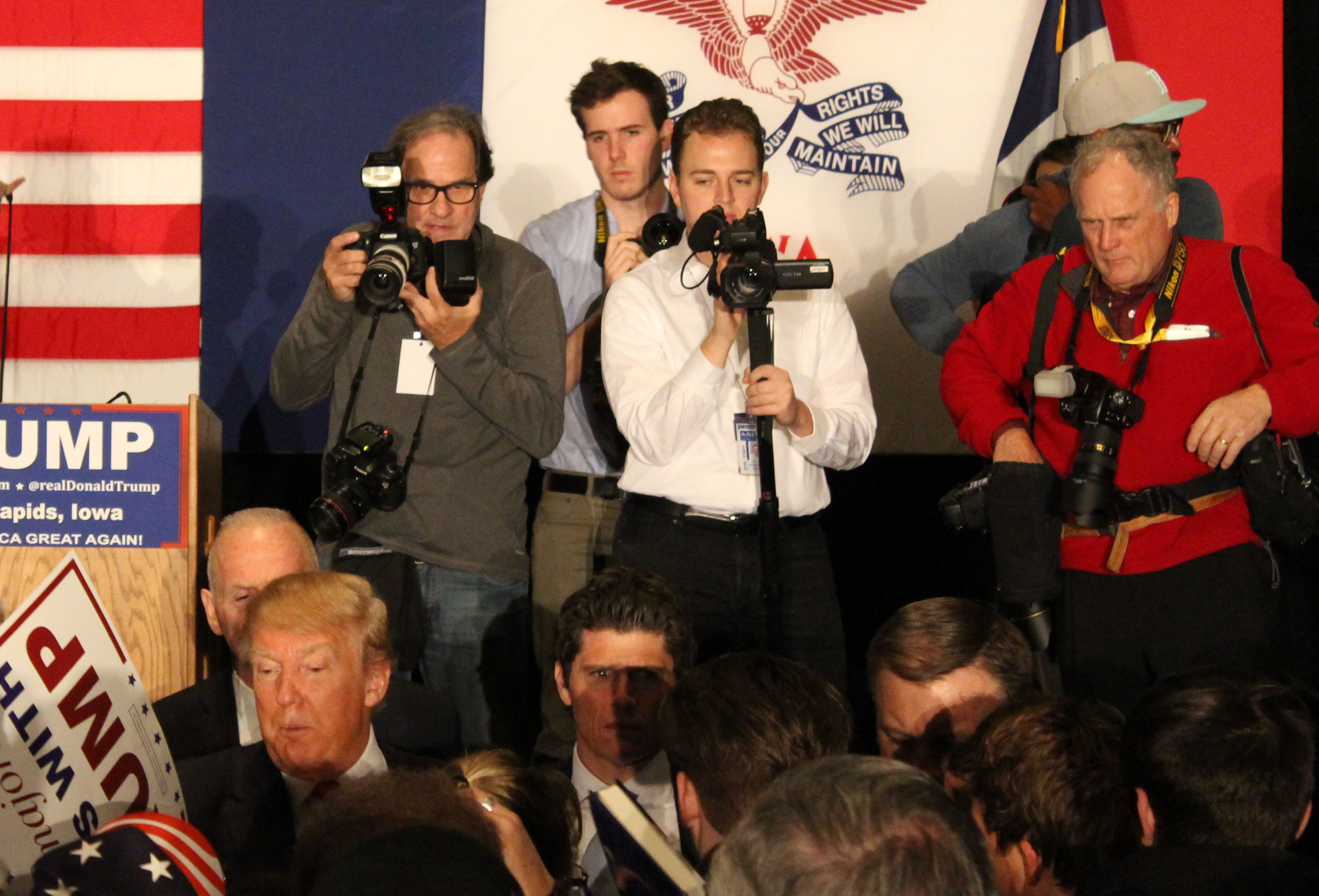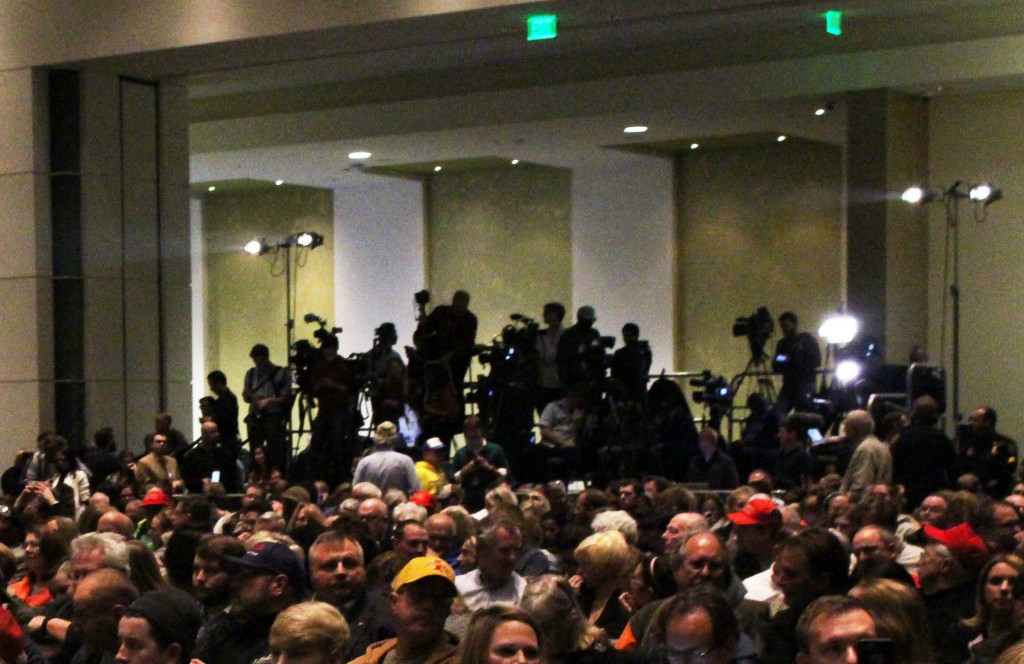
I can say without reservation that not much of what came out of Donald Trump’s mouth resonated or even registered with me at the Iowa caucuses.
The billionaire real estate mogul was his usual bombastic self onstage at a campaign rally in Cedar Rapids, Iowa, but what truly gave me pause was Trump’s paradoxical — and problematic — relationship with the press at his event.
As a student journalist covering the Iowa caucuses, I had been amazed at the level of access my colleagues and I were allowed at the various campaign rallies we attended. I had even been invited to stand on Dr. Ben Carson’s stage to get better pictures of the candidate while he was signing autographs. Going into the Trump rally, however, fellow students who already had attended one of his events warned me that the general attitude toward journalists would be “very controlling.”
True to their word, the security at the Trump rally was tighter than at any event we had been to so far. After waiting in line with fellow journalists to get our press passes — which were unabashedly adorned with Trump’s name, website, slogan and Twitter handle — we had to submit our bags to detection dogs and hand searches by the Secret Service. After a 15 minute process, they found just two objectionable items — our water bottles. No hard objects, they said. A protester threw a tomato at Trump at a previous rally, and they were clearly trying to avoid any potential projectiles.

While the level of security was somewhat understandable — Trump is an international figure, after all — the controlling attitude toward the press didn’t end there. There were specially designated areas at the back of the venue, behind the crowd, where journalists were told to stay. If any journalists ventured outside the designated press areas, they were firmly asked by security to go back. I witnessed a few brave photographers removing their press passes and venturing near the stage to get pictures, and denying being journalists when confronted. In the end they were escorted back to the designated areas with little confrontation.
While we as student journalists had no trouble getting credentials, we heard from a couple of foreign journalists that they were unable to get press passes to Trump’s events.
“They tell us there is no room for media right now, because there are so many journalists from around the U.S.,” said Norbert Hoefler, a German journalist from Stern magazine. “They told us ‘We are sorry, but it’s not possible.'”
Trump has been playing the media like a fiddle his entire campaign, and he knows it. When he finally took the stage, he was quick to address the elephant in the room.
“Look at all those cameras! Nobody else has that,” Trump said, pointing to the back of the room as the entire audience turned to look. “They give me so much time on television.”
Trump claims to have spent “almost nothing” on his campaign so far thanks to the media attention he has received. Despite this, Trump had nothing but criticism for the media in attendance, and was all too happy to dispense it from afar.
“Some of the most dishonest people in the world are the ones standing behind those cameras, I tell you what … the media,” Trump said to cheers and applause from the audience. “Very dishonest group of people.”
Trump claimed journalists never show how big the crowds are at his rallies on TV.
“I always thought those cameras were fixed, like they couldn’t move,” Trump complained. “The audience was unbelievable, this big stadium … they didn’t show [the audience], all they ever show is [my] face … the only time they ever show the crowd is when there’s a protester.”
Does Trump realize the media are restricted to the back of the room? If nothing else, that limits the availability of different shots of the venue, for television and for photographers. If Trump wants more coverage of his events, maybe he should try lifting the controlling rules for the press at his events. What exactly is he afraid of?
Trump continued to bemoan the image he thinks the media create for him day-by-day. He claimed the news stories about his rallies seemed to paint him as a tough guy one day and a weakling the next. Still, he claimed the media attention he gets has saved him a lot of money.
“I’m number one [in the polls] and I’ve spent almost nothing, I’ve spent very little,” Trump said. “At this point … I was going to have spent almost $40 million, and I’ve spent almost nothing.”
I might be a just humble student journalist, but I truly think this is something many professional media outlets need to understand — constant media coverage of Trump only helps him. I have suspected this for a while, but I’ll admit I was taken aback to hear him say it outright.
Here is a man who has the means to fund his campaign without the need for outside donations. While other candidates struggle to raise funds, and the constant Trump coverage is making it possible, by his own admission, for him to spend very little. You would think since they help him out so much, Trump would love the media, right? If he does, he certainly doesn’t show it.
I fully appreciate the irony of the fact that by writing this article I, too, am giving Trump more media coverage. However, I am writing this is to critique a phenomenon that as a journalist I find deeply troubling — Trump is being handed publicity and attention on a silver platter. I understand Trump is a spectacle, but a journalist’s job should not be to report on spectacle — it should be to inform the public about newsworthy matters that serve the public good.
I think everyone can agree Trump, of all the candidates, does not need free publicity. So why do the media continue to give it to him?
